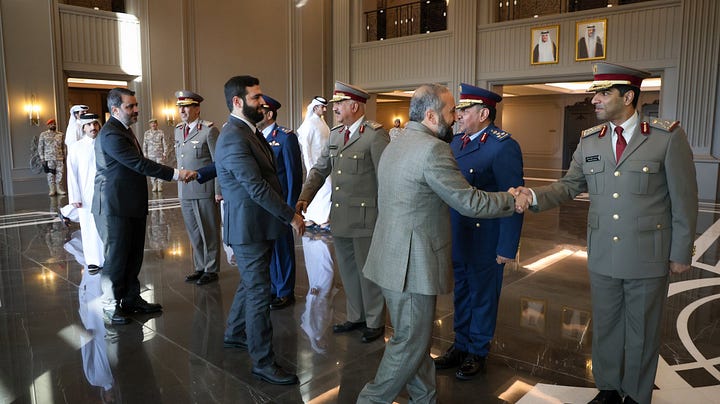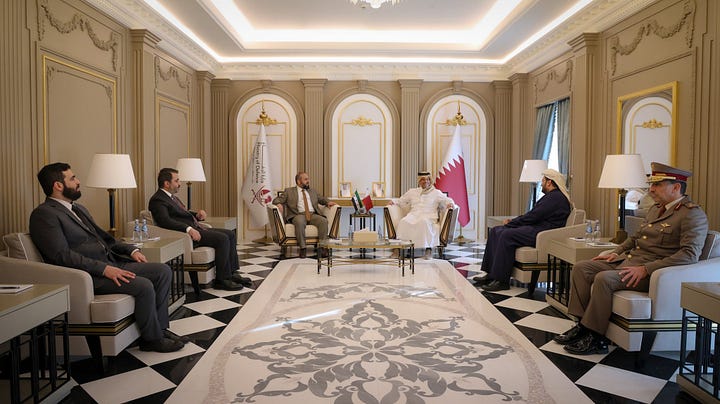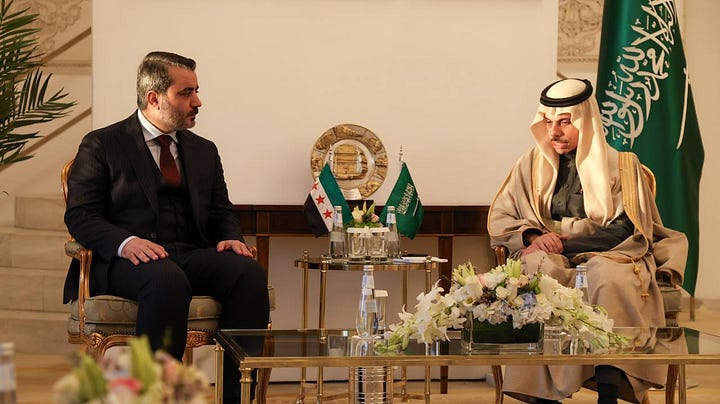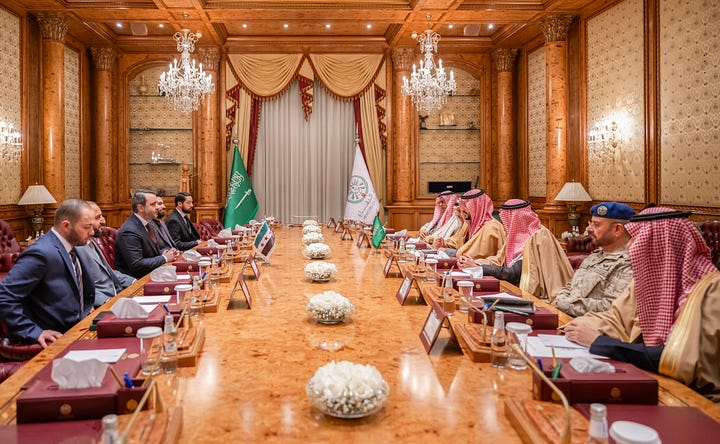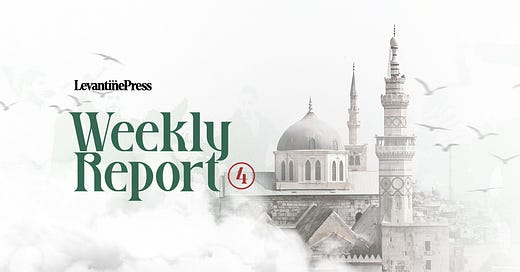Syria Weekly Report #4
Weekly Report on Syria, w/b 30/12/24: updates on the political transition, economy, foreign policy, social developments, and more.
This week’s report looks at Syria’s ongoing political transition and state-building efforts, the government’s fight to restore basic economic services and infrastructure, foreign affairs with Europe and the Arab Gulf states, and the ramifications of the return of Syria’s Ulema.
The Return of the Ulema to Syrian Society
The return of Syria’s ulema (the Islamic scholarly class) from exile will factor heavily into Syria’s social and political stability and Syria’s future impact on the world.
Syria’s Islamic scholarship is among the most prestigious in the Muslim world. Damascus has long been a centre of learning rivalling that of Al-Azhar in Cairo, Madina in Saudi Arabia, and Deoband in India, among other places. Severely repressed by the Assad regime, a new environment in which Syria’s scholars can organise, write, and preach freely is going to influence Islamic currents on a global scale.
If and how this occurs depends on the relationship formed between Syria’s liberators, led by Ahmad Al-Shara and Hay’at Tahrir Al-Sham (“HTS”), and the Syrian scholarly establishment. The return of two internationally renowned scholars to Damascus this week are of note, among many others who have and are planning to return.
Firstly, Usama Al-Rifai returned to Damascus on January 4th. Al-Rifai is one of Syria’s most famous scholars and a long-term opponent of the Assad regime. In 1981, Al-Rifai went into exile to Saudi Arabia as opposition to Hafez Al-Assad was met with severe crackdowns, and the year after, the Assad regime stormed Hama, killing anywhere between 10,000-40,000 civilians and razing much of the city to the ground. Al-Rifai would later return to Syria, and he and his followers in Damascus provided some of the earliest and staunchest opposition to the regime at the outset of the Syrian revolution in 2011. Al-Rifai and his congregation faced threats and attacks from the shabiha of the regime, with one vicious night raid on the Al-Rifai mosque in the district of Kafr Sousa resulting in injuries which put Al-Rifai in hospital. After this, Al-Rifai went into exile in Turkiye and contributed to the formation of the Syrian Islamic Council in 2014. In 2021, Al-Assad abolished the position of Mufti within the Syrian Republic. In response, the council nominated Al-Rifai as Syria’s Grand Mufti. This has generally not been disputed by other factions in the opposition.
Al-Rifai, and the council in general, have traditionally been very critical of HTS. However, there have been signs of a rapprochement in recent years, and Al-Rifai’s safe return to Damascus with the provision of an armed guard suggest a developing relationship between Al-Rifai and the HTS-led administration.
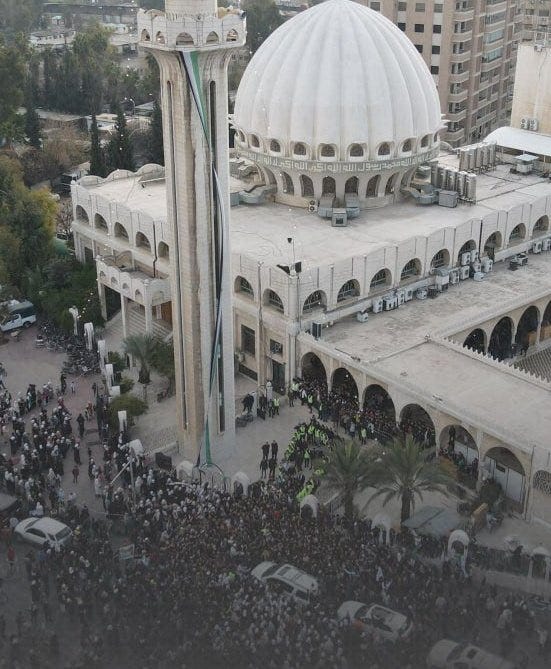
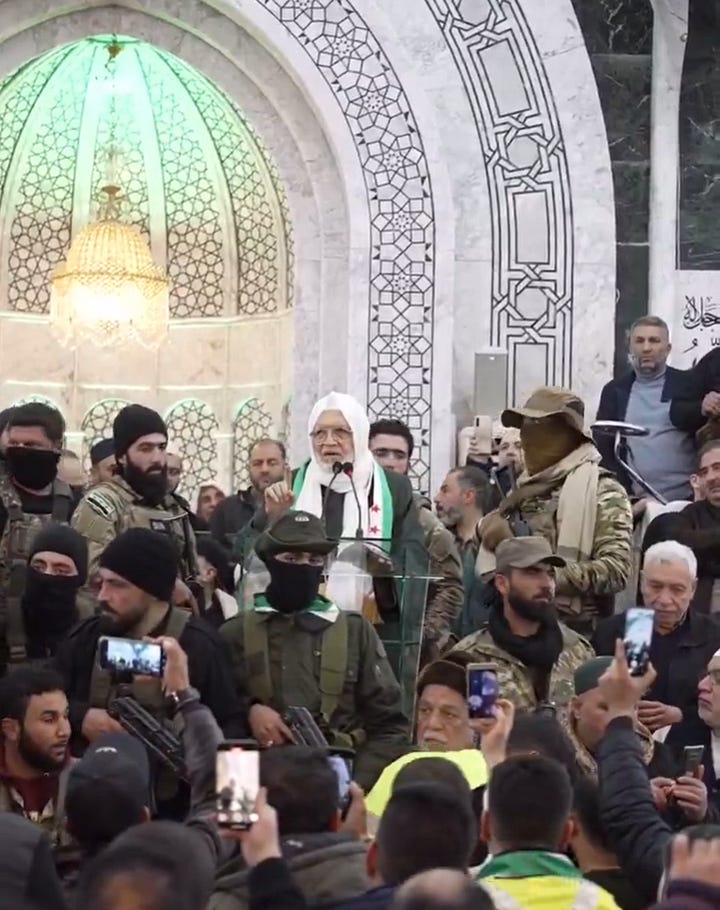
Secondly, Dr. Ratib Al-Nabulsi, another of Syria’s famous scholars in exile, also returned to Damascus on January 1st, meeting with his mosque congregation and the students of his sharia college. What is remarkable is that many of the young women attending Al-Nabulsi’s college in this video were not even alive when he was forced into exile, showing the sway that Syria’s scholarly establishment maintained in Syrian society even in the deepest years of repression, and strongly suggests that this influence will grow even greater in a free environment.
Al-Nabulsi met with Al-Shara on January 5th to congratulate him on the victory of the Syrian revolution, and it is expected that more of the Sunni ulema will visit with Al-Shara in the coming weeks and months ahead.
The general return of Syria’s scholars presents Ahmad Al-Shara with opportunities and challenges. Al-Shara is now Syria’s premier statesman, and if he wants to maintain that role, he has to build a broad political tent. Syria is roughly 80% Sunni (with Arabs forming 70% and the Kurds forming another 10%). Most of Syria’s Sunni community is deeply religious and the authority of the ulema class, for many, is above even the authority of the state. An alliance between Syria’s scholarly establishment and Al-Shara’s state-building efforts would unify the majority of the country under one legitimate authority, making a counter-revolution from within Syria’s Sunni majority extremely unlikely.
The return of Syria’s scholars also means a counterbalance against the salafi ideological variants that grew to dominate in revolutionary-governed areas prior to the fall of the regime. In any case, building a broad Sunni coalition will require concessions from all sides and a willingness to tolerate a greater ideological variety among Sunnis than what existed before the revolution or under Al-Assad. There are signs that this is being attempted: Mazhar Al-Wais, one of HTS’ top jurists and of salafi inclinations, congratulated Al-Rifai and Al-Nabulsi on their return to Damascus.
Building a broad Sunni tent will be one of Al-Shara's most important domestic political achievements over the coming months and years and would cement Syria’s road to social and political stability. The assiduous cultivation of Syrian Islamic scholarship will also see its influence grow on a global scale with ramifications for wider intellectual and cultural trends in the Muslim world.
The Political Transition & State-building Efforts
The National Dialogue is Delayed
In our previous weekly report, we looked at plans for the National Dialogue conference, where Syrians from all regions and walks of life would be invited to participate in conversations on the constitution and wider future of Syria. There are reports that the National Dialogue is now being postponed because of logistical difficulties.
This is not surprising. As with the four-year roadmap to elections, there is a great deal of optimism that has to be tempered by a realistic appraisal of the situation on the ground in Syria. Assembling over a thousand Syrians from all walks of life, that the wider population feels is adequate for this initial stage of representation, all within the first month of liberation, is a crucial but logistically challenging step.
Considering the impact this dialogue would have on the future of Syria, rushing it could potentially negatively impact Syria’s first steps to forming a truly national dialogue. Realistically, Syria requires between 3-6 months to restore basic services, security, and a government presence in all areas. The dialogue should happen once these basic needs are met, which could mean a dialogue occurring in spring or even the early summer. This would also require an extension of the current transition government from the previous soft target for its end in March 2025 to the summer, necessary to continue the hard work now being done on the ground by Syria’s skeleton civil service to restore the basic trappings of state.
Ghost Employees and Salary Hikes
In our weekly report covering the first week after the overthrow of the Assad regime, we outlined the transition government’s plans to match government salaries across Syria (the regions under transitional government control) in line with former Syrian Salvation Government salaries in Idlib, which would be a 400% increase from roughly $25 to $100 a month.
On January 5th, the interim finance minister Muhammad Abazeed announced that the government had completed an ‘administrative restructuring of ministries’ that means this 400% salary hike can now take place at the beginning of February. This will cost $127 million and will be financed by ‘existing state resources and regional aid, new investments, and efforts to unfreeze Syrian assets held abroad.’
The finance ministry had initially planned this salary hike for January, but the process of restructuring across ministries in the dilipidated Syrian state has revealed tens of thousands of defected or fraudulent ‘ghost workers’ drawing salaries from the state under fake identities. This widespread fraud was part of the Assad regime’s system of crony corruption that rewarded loyalists at the public expense.
The interim health minister Maher Al-Shara also confirmed a similar ghost employee epidemic at the health ministry. Out of 82,700 employees, only around 27,000 were doing real work, while the rest were data entry clerks and administrative employees. They are being let go from the ministry with three-months’ severance pay.
In total, there are 1,300,000 registered state employees which is nearly 6% of Syria’s entire pre-war population of 22 million. Cutting this number is not just a matter of balancing the books, as the Assad regime used the government as a vehicle for sectarian favouritism. The government will have to be careful in how and who is fired to mitigate any feelings of ‘sectarian revenge’, or to create economic impoverishment (which could also lead to civil unrest) as the only source of sustenance for many in Syria has been through the state.
Balancing reform of the state with material improvements will go hand-in-hand throughout the year ahead.
Economy & Infrastructure
The momentum and legitimacy of Al-Shara and the transition government depends on what they deliver on in the next ninety days. In the short term, public demand largely revolves around regular access to basic necessities: bread, electricity, and fuel.
Food prices are dropping due to a combination of: removing exorbitant fees and bribes imposed by the Assad regime, increased regulation on price-gouging, and the partial opening of Syria’s economy to foreign goods (particularly Turkish). Price-gouging remains a serious problem where the new government’s presence is weaker, such as outside main markets in the largest cities. Ministerial reforms and ongoing recruitment efforts are expected to expand government presence and counter illegal economic activity.
There are intense ongoing efforts now to restore a modicum of civilised life to Syrians by fixing Syria’s severely degraded energy grid. In Assad-controlled Syria, electricity had become a luxury, often operating for 2-4 hours a day at the best of times. Interim electricity minister Umar Shaqruq held an interview with Al-Jazeera outlining the key challenges facing Syria’s electricity infrastructure, noting that it had nearly collapsed and that a full overhaul of the power grid would be necessary. The government has set a goal to improve electricity provision to at least 8 hours a day by March 2025, and to 24/7 provision by 2028. Additionally, over the coming decade Syria will need to invest in new power plants and infrastructure. The government is currently working with Jordan who are preparing infrastructure to provide electricity, and with Turkiye who already provides electricity to Idlib and northern Aleppo and is now working with the Syrian government to expand this provision throughout the country.
Foreign Affairs
The Franco-German Delegation Disappoints in Damascus
The French and German Foreign Ministers Jean-Noël Barrot and Annalena Baerbock, respectively, visited Damascus on Friday 3rd to meet with Ahmad Al-Shara and members of the transitional government, and members of Syria’s civil society.
Their visit caused controversy owing to several gaffes. German FM Baerbock was criticised for her general decorum, including a strangely informal ‘uniform’ when meeting with Al-Shara, and patronising comments on the EU’s ‘refusal to finance Islamist infrastructure’ and maintaining sanctions ‘until change is seen’. Baerbock also stirred wider debate on the lack of handshakes between Baerbock (a woman) and Al-Shara, an odd sticking point in the general situation Syria finds itself in. French FM Barrot also caused controversy by making a point of visiting a group of Christian leaders in Damascus before meeting with Al-Shara, harkening to France’s self-image as ‘protector of the Christians in the Levant’, a colonial archetype found extremely distasteful by Syrians who are trying to re-unify and rebuild the country. Sources also suggest that Barrot completely refused to discuss the issue of lifting sanctions with Al-Shara.
The Franco-German delegation has misread both the public mood and the geostrategic situation that the EU finds itself in with regards to Syria. Their stance on sanctions relief make it harder for Syrians in exile to return, and for the country to rebuild its economy and infrastructure, which threatens Syria’s delicate stability. Sanctions on the Assad regime no longer have any basis with its fall and maintaining those sanctions is being seen by Syrians as equivalent to holding the Syrian people, inside and outside of Syria, as hostages for the political agenda of the EU.
Additionally, the simple fact is that in 2025, Syria has more options than the EU. Turkiye and the Gulf Arab states have pledged full support for the rebuilding of Syria to the tune of billions of dollars in the interim; further afield, new industrial powers like China may also take an interest. The EU risks being left behind in an increasingly hot race to develop a relationship with the new Syria.
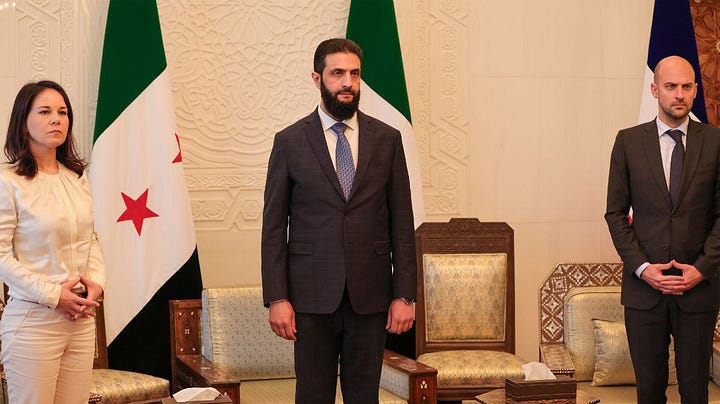
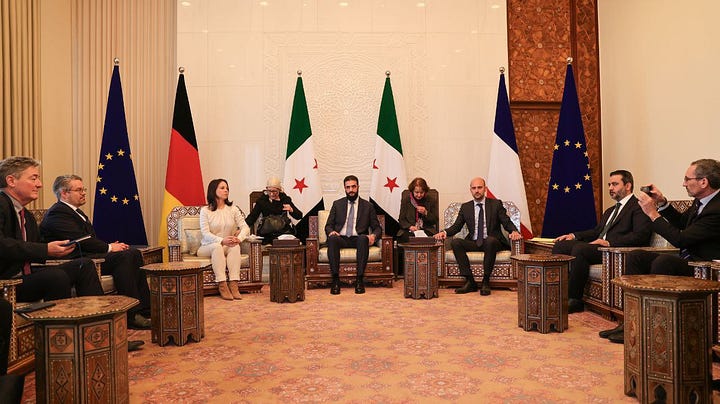
Allies Closer to Home
Unlike the EU, Gulf Arab states are not dragging their feet in their support to Syria. A Gulf Cooperation Council delegation led by the Kuwaiti council chief Jasem Al-Budaiwi visited Damascus on December 31st. The Syrian government has also sent a delegation including foreign minister As’ad Al-Shaybani, intelligence minister Anas Khattab, and defense minister Marhaf Abu Qasra to Riyadh on January 2nd and Doha on January 5th for high-profile talks with the Saudi and Qatari governments. This included discussions on Syria’s political transition and re-integration in the Arab world and humanitarian aid. Saudi Arabia and Qatar, alongside Turkiye, have led the way on providing humanitarian support to Syria. Saudi Arabia has sent delegations to Syria to coordinate humanitarian relief and established a land-and-air bridge to deliver regular aid shipments. The presence of intelligence and defense ministers Khattab and Abu Qasra show that security issues are high on the agenda and the Gulf seeks to help stabilise Syria’s security situation to prevent its exploitation by Iran or ISIS.
Foreign minister Al-Shaybani’s tour of duty this past week shows a strategic effort in foreign policy by the new Syrian government. Al-Shaybani’s interview with Al-Jazeera (in Arabic) provided further clarity on Syria’s emerging foreign policy vision: a ‘zero problems’ foreign policy and establishing relationships with relevant regional and international states and organisations. The success of this strategy is crucial for the transitional government to establish its legitimacy and see sanctions lifted to aid in Syria’s economic recovery.
